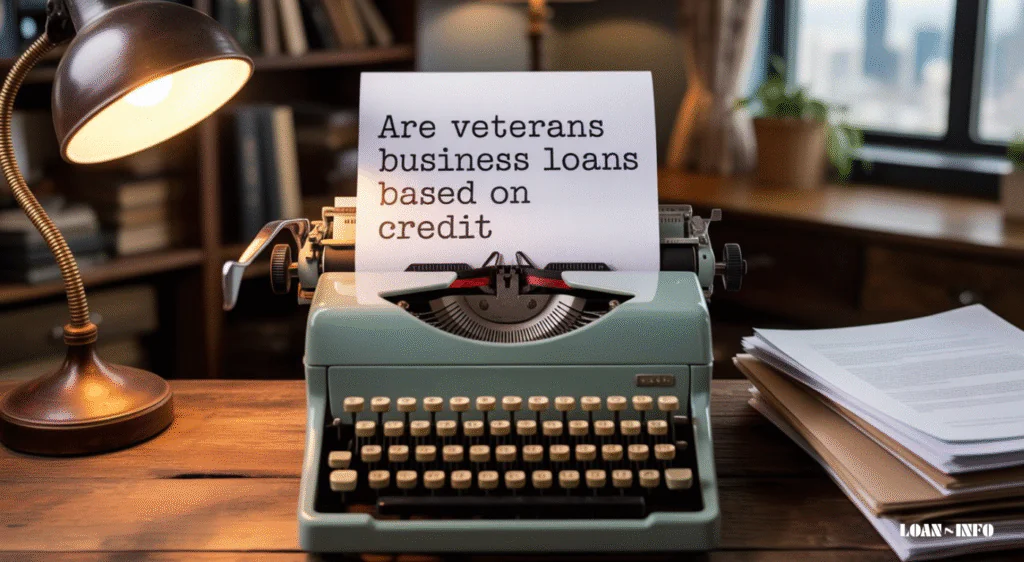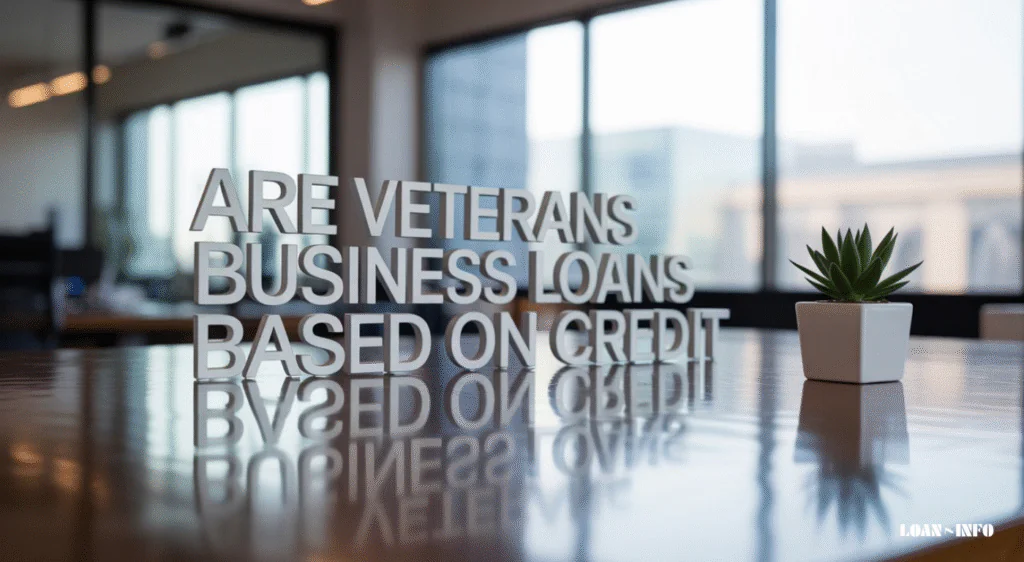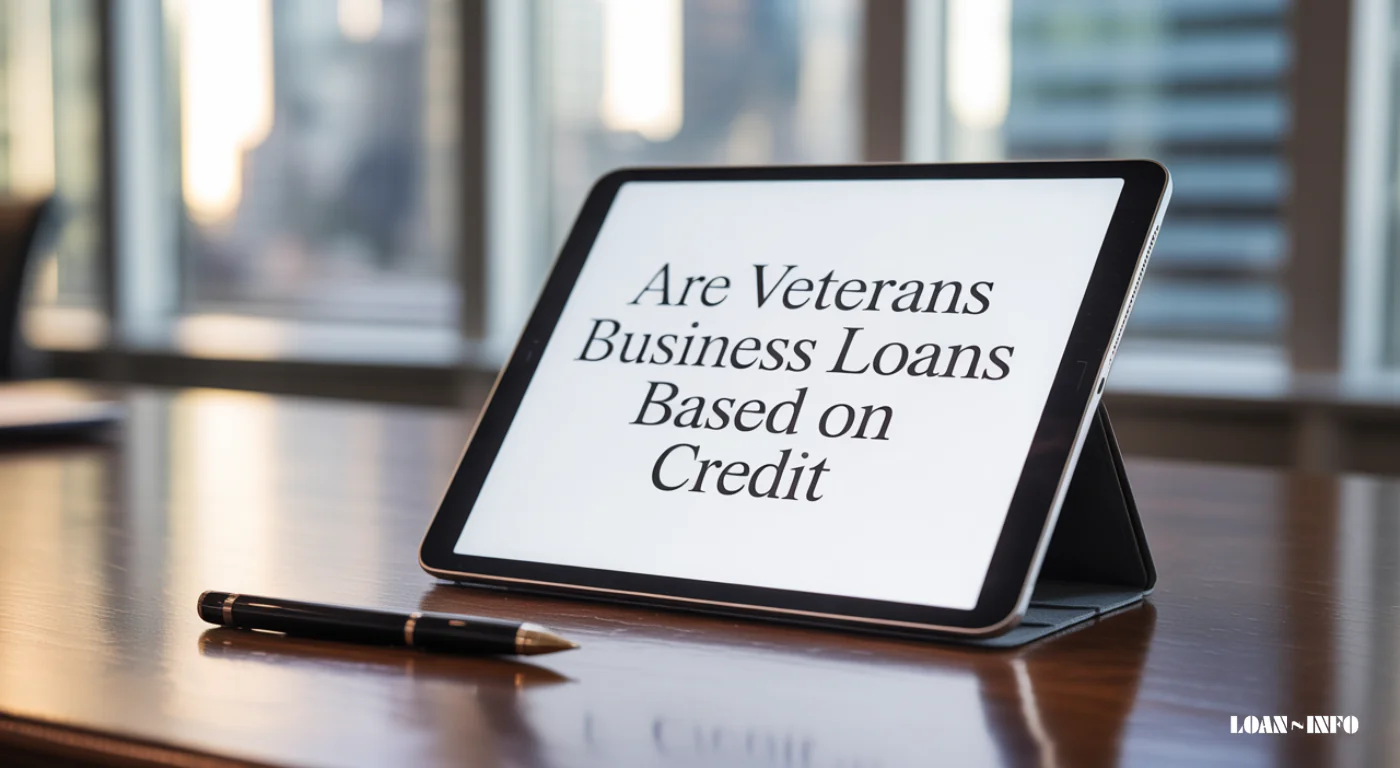Securing funding after military service can feel like a mission of its own, especially when credit comes into play. Many military veteran entrepreneurs ask the key question: are veterans business loans based on credit? The truth is, while credit is an important factor, it isn’t the only one lenders examine.
Veterans often have access to specialized programs such as veteran small business loans and SBA loans for veterans, which sometimes provide flexibility even if credit is less than perfect. Resources like Veterans Business Outreach Centers (VBOCs) and credit unions also offer tailored support. Understanding how credit works with these loans helps veteran-owned businesses prepare for approval and long-term success.
What Are Veterans Business Loans?
Veteran small business loans are financial products designed for military veteran entrepreneurs who want to launch, grow, or stabilize their businesses. Unlike regular loans, these programs often come with special features such as lower fees, longer repayment terms, and access to mentorship and advisory services for veterans.

Programs supported by the Small Business Administration (SBA), such as SBA loans for veterans, remain the most common choice. In addition, credit unions like Navy Federal Credit Union business loans and Service Credit Union loans provide alternatives, while nonprofit organizations like Warrior Rising nonprofit or marketplaces like Lendio marketplace loans and Kiva microloans for veterans expand the options further.
Are Veterans Business Loans Based on Credit?
Yes, lenders often rely on credit score requirements for loans to decide whether to approve or deny an application. A strong score shows you pay bills on time and handle debt responsibly. This can make the difference between approval and rejection for many VA business loans or SBA-backed funding.
However, veterans sometimes believe that service alone guarantees approval. That is not the case. Lenders still look at your financial background, though some programs supported by the SBA Veterans Advantage Program or Veterans Business Outreach Centers (VBOCs) may offer flexibility for those with weaker credit histories.
Credit Score Requirements for Veteran Business Loans
The credit requirements for veteran loans vary depending on the lender and loan type. For example, an SBA 7(a) loan usually requires a personal score of at least 680, while an SBA microloan may accept applicants with lower scores if other conditions are strong.
This table shows the common credit score requirements for loans:
| Loan Type | Minimum Credit Score |
|---|---|
| SBA 7(a) loan / SBA Express Loan | 680+ |
| SBA 504 loan | 680+ |
| SBA microloans | 620+ |
| Navy Federal Credit Union loans | 650+ |
| Service Credit Union loans | 640+ |
Other Factors Lenders Consider Beyond Credit
Credit is important, but lenders also study the full picture of your finances. They look at debt-to-income ratio, which measures how much of your income already goes toward paying debts. A lower ratio suggests you can handle new payments more easily.
In addition, banks and credit unions want to see a strong business plan preparation that shows growth potential. They check revenue, cash flow, and even industry risks. Veterans must also provide a DD Form 214 (proof of military service) to prove eligibility for veteran loan eligibility criteria.
Do Veterans Get Special Loan Benefits Despite Low Credit?
Yes, there are still advantages. Programs backed by the Small Business Administration (SBA) sometimes waive or reduce guarantee fees for veterans under the SBA Veterans Advantage Program. This means even with average credit, you may still get affordable financing.

Veterans also benefit from mentorship and advisory services for veterans through Veterans Business Outreach Centers (VBOCs) and the Boots to Business Training Program. These resources help with startup funding for military veterans and improve chances of approval, even when credit is not perfect.
Best Loan Options for Veterans With Good Credit
If you have strong credit, the best choices include the SBA 7(a) loan, SBA 504 loan, and even larger SBA Express Loan amounts. These loans offer better interest rates and repayment terms than most alternatives.
Private lenders like Navy Federal Credit Union business loans and Service Credit Union loans are also excellent for veterans with high scores, offering flexible commercial vehicle loans, equipment financing for veterans, and even a business line of credit for veterans.
Loan Options for Veterans With Bad Credit
If your score is low, there are still ways forward. Kiva microloans for veterans provide up to $15,000 through community funding, often without strict credit score requirements for loans. Similarly, Lendio marketplace loans connect veterans with lenders who may consider revenue more than credit.
Other options include business grants for veterans, which do not require repayment, and microloan programs and crowdfunding platforms that help raise money when banks say no. These solutions give hope for those seeking bad credit veteran business loans.
How to Improve Your Credit Score Before Applying
Improving credit takes time, but small steps add up. Paying bills on time, keeping balances low, and fixing errors on reports are essential. Veterans can also use secured credit cards or small installment loans to build history before applying for larger funding.
It is wise to review your credit score requirements for loans in advance and work on lowering your debt-to-income ratio. These steps show lenders you are serious about financial responsibility and can unlock access to better rates.
How Much Can You Borrow With a Veterans Business Loan?
Borrowing limits vary widely. For example, the SBA 7(a) loan allows up to $5 million, while the SBA Express Loan caps at $500,000. An SBA 504 loan can reach $5.5 million, mainly for property or equipment purchases.
Credit still influences how much you can borrow. Veterans with higher scores generally access larger amounts, while those with weaker credit may qualify for smaller sums through microloan programs and crowdfunding or short-term products like business line of credit for veterans.
Application Process: How to Apply and Get Approved
Applying for veteran small business loans follows a clear path. First, gather documents like your business plan preparation, tax returns, bank statements, and DD Form 214 (proof of military service). These materials show both your business readiness and your service history.
Next, research lenders carefully. Compare SBA loans for veterans, credit union offers, and alternative lenders. Submit your application, then be ready for follow-up questions. Strong preparation increases your chance of success, even with tough credit score requirements for loans.
Pros and Cons of Veterans Business Loans Based on Credit
The main advantage of good credit is access to higher limits, lower interest, and better terms. Veterans with strong histories can use programs like SBA 504 loan or Navy Federal Credit Union business loans to finance growth affordably.

The downside is that poor credit limits choices and may push veterans toward higher-cost options or predatory lenders small business deals. Still, with careful planning, even bad credit veteran business loans can help while you work on building a stronger profile.
Final Conclusion — Are Veterans Business Loans Based on Credit Worth It?
So, are veterans business loans based on credit? Yes, but credit is only part of the bigger picture. Veterans with strong scores enjoy better opportunities, yet those with poor credit still have paths forward through microloan programs and crowdfunding, business grants for veterans, and nonprofit programs.
With support from Veterans Business Outreach Centers (VBOCs), resources like the Boots to Business Training Program, and flexible funding platforms, every veteran has a chance to succeed. The key is preparation, research, and persistence—qualities that most military veteran entrepreneurs already know well from service.
FAQs About Veterans Business Loans Based on Credit
Can I get a VA business loan with bad credit?
Yes, it’s possible. Some lenders accept lower scores, but rates and terms may be less favorable.
What are the requirements for a VA business loan?
You’ll typically need proof of service (DD Form 214), a solid business plan, and to meet credit score requirements for loans.
Are VA loans based on credit?
Yes, most VA business loans consider your credit, though other factors like income and debt-to-income ratio also matter.
How much will the VA give for a business loan?
Loan amounts vary, but some SBA loans for veterans go up to $5 million.
Can an LLC get a VA loan?
Yes, veteran-owned businesses structured as LLCs can qualify if they meet veteran loan eligibility criteria.
How long does it take to get a VA small business loan?
Approval often takes 30–90 days, depending on lender review and your documentation.
More Posts
